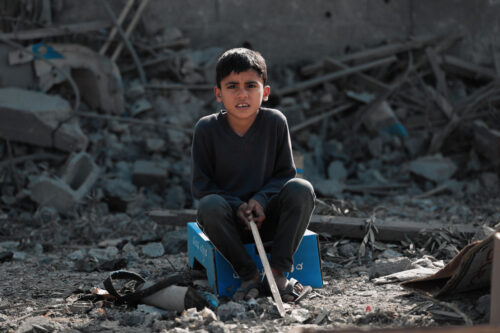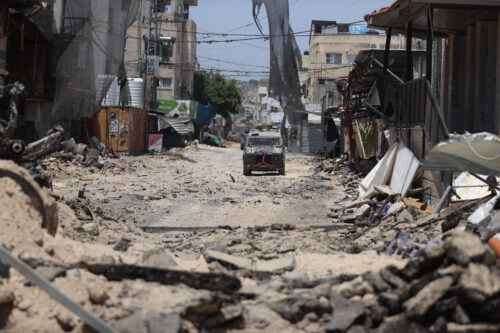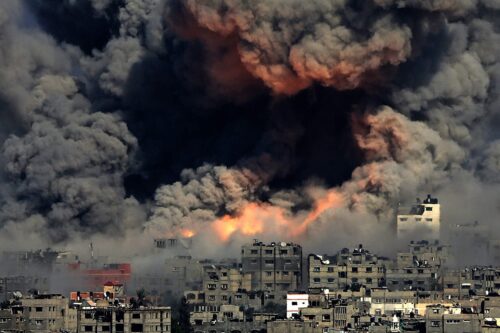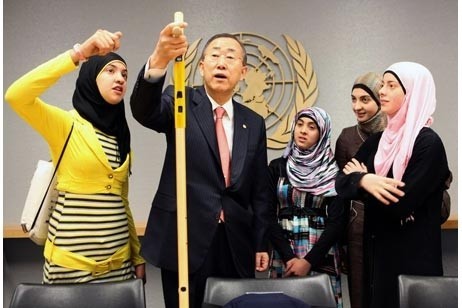Living in fear: the struggles facing pregnant women in Gaza

The wellbeing of expectant mothers is an important indicator of the overall health of a population: good maternal health reflects a well-functioning healthcare system which is central to the needs of society. While navigating a whole range of life-changing emotions, from feelings of joy and anticipation to overwhelming anxiety, strong support systems are crucial to helping women ensure their pregnancies run smoothly. In Gaza, sadly, the experiences of mothers-to-be are largely shaped by a lack of support from maternal health services- brought on by conflict, poverty, occupation and siege.
The blockade on Gaza
The blockade on Gaza imposed in 2006 restricts the import of medical supplies and equipment, leaving one third of all supplies at critical or ‘zero stock’ levels. A reduction in sterilisation and cleaning facilities means that women in labour, and those in need of emergency surgery, face a very real risk of experiencing serious complications during child-birth.
Because maternal healthcare facilities are so overstretched, ill-equipped and understaffed, women experiencing high-risk pregnancies are increasingly being referred outside the Gaza Strip. The likelihood of being approved, however, remains low, with approval rates falling as low as 44 percent in 2016. It is therefore unsurprising that Palestinian women die in childbirth – in cases that are nearly all preventable – at a rate that is 4 times greater than Israeli women.
Conflict
During the 2014 Israeli offensive on Gaza, known as “Operation Protective Edge”, more than 250 pregnant women were wounded and 16 more were killed. While the majority of doctors were forced to focus their efforts on treating the wounded, maternal health services declined by more than 70% during the assault.
With over 500,000 people displaced during the conflict, pregnant women were left vulnerable and with nowhere to seek medical attention. More than 10,000 displaced pregnant women were left at risk of giving birth in shelters, without sanitation or vaccinations for their children.
Poverty
The ten year siege on Gaza has left more than 80% of its population reliant on international aid for food and basic supplies to survive. Expectant mothers are particularly at risk from a lack of healthy and nutritional food, with one third suffering from iron deficiency anaemia.
Mothers-to-be face further health risks every day as they consume water polluted with nitrates and chloride. With its only aquifer and main source of water contaminated by sewage, chemicals and seawater, more than 95% of water in Gaza is unfit for human consumption. The health of newborns is at risk too, with a quarter of all infant illnesses in Gaza caused by waterborne diseases.
High levels of poverty mean that women are unable to seek treatment for conditions affecting themselves and their children, with serious consequences to their health.
Power crisis
At least 30 hospitals and 70 primary health care centres in Gaza are at risk of closure due to continued power outages. Hospitals in the Gaza Strip rely on ageing generators to keep facilities running. With the waiting time for some types of elective surgery extending up to 18 months, hospitals are often forced to cancel operations in order to keep life support facilities running.
With little access to emergency antenatal and postnatal care, pregnant women are bearing the brunt of Gaza’s continued power crisis.
How you can help
With your support, Interpal will be delivering brand new medical equipment to the Obstetrics and Gynaecology Clinic at Al Rahma Medical Centre in Gaza, which will provide health care services and periodical check-ups to more than 500 local women who are in the pregnancy and postpartum period.
For just £20, you can help to ensure a safe pregnancy and delivery for a mother and her baby in Gaza.
Be a lifeline #For Palestine. To donate, please visit www.interpal.org or call 020 8961 9993
Calculate your Zakat
Confused about how to calculate your Zakat? Try our simple-to-use calculator





